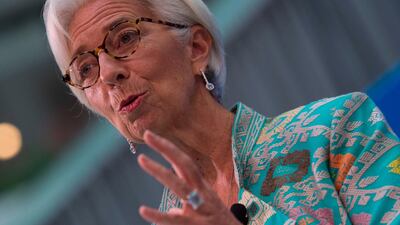The International Monetary Fund is getting ready to cut its forecast for global growth next week as escalating trade war rhetoric and measures between the world’s two biggest economies clouds the outlook, its managing director said.
The stark warning comes after the Washington-based lender in July predicted global economic growth to hit 3.9 per in 2018 and 2019. However, there are signs that growth has plateaued and is becoming less synchronised, with fewer countries participating in the expansion, Christine Lagarde said in prepared remarks for the IMF’s upcoming annual meeting in Bali, Indonesia later this month when it will update its World Economic Outlook.
“Six months ago, I pointed to clouds of risk on the horizon…. today, some of those risks have begun to materialise. The outlook has since become less bright, as you will see from our updated forecast next week,” Ms Lagarde said.
“A key issue is that rhetoric is morphing into a new reality of actual trade barriers. This is hurting not only trade itself, but also investment and manufacturing as uncertainty continues to rise.”
Ms Lagarde, along with the World Bank and the World Trade Organization officials, has repeatedly warned about the negative impacts of tit-for-tat rounds of tariffs between the US and China on the prospects of economic growth across the world.
In September US president Donald Trump imposed fresh tariffs on $200 billion worth of goods, bringing the total to $250bn since he ratcheted up the trade war with China earlier in the year, citing an unfair trade balance between the two nations. China retaliated and imposed duties on $60bn of goods from the US. Beijing has also rejected the possibility of another round of trade talks with Washington, accusing the Trump administration of putting a knife to China’s throat.
Although, the global growth is still at the highest level since 2011, recent data suggest a cooling off. Factory activity plunged from Asia to Europe in September, according to Bloomberg data.
“For most countries, it has become more difficult to deliver on the promise of greater prosperity, because the global economic weather is beginning to change,” Ms Lagarde said.
______________
Read more:
Trade barriers need reforms to temper tensions, IMF and World Bank say
US-China trade tensions will worsen and impede global growth, says Moody’s
Trumpian Trade Wars threaten the GCC
______________
She stressed the need for resolving trade issues, saying the stakes are high as import restrictions prevent trade from playing its essential role in boosting productivity, spreading new technologies and reducing poverty. The immediate challenge is to strengthen rules. This includes looking at the distortionary effects of state subsidies, preventing abuses of dominant positions and improving the enforcement of intellectual property rights, she added.
“History shows that, while it is tempting to sail alone, countries must resist the siren call of self-sufficiency,” Ms Lagarde noted. “Going forward, what we need are smarter rules for trade that ensure all can gain. We need to fix the system, not destroy it.”
The growing number of trade discussions and proposals, most recently between the US and Canada and Washington’s talks with the European Union are positive steps, however, there is further work to be done, the IMF managing director said.
The US has reached a deal to revise the trilateral trade pact with Canada and Mexico and the Trump administration last week signed a revised trade agreement with South Korea.
Ms Lagarde also called upon governments to guard against the “fiscal and financial turbulence,” saying that the system, 10 years after the financial crisis was safer, but “not safe enough” and a push is needed to implement the financial regulatory agenda.
A decade of relatively easy financial conditions has pushed debt levels to new highs in advanced, emerging, and low-income countries. The global debt -- both public and private—has reached an all-time high of $182 trillion - almost 60 per cent higher than in 2007 according to IMF estimates, she noted.
This buildup has left governments and companies more vulnerable to a tightening of financial conditions.
“The emerging and developing economies are already feeling the pinch as they adjust to monetary normalisation in the advanced world,” she said.
“We estimate that emerging economies—excluding China—could potentially face debt portfolio outflows of up to $100bn —which would broadly match outflows during the global financial crisis. This should serve as a wake-up call.”


